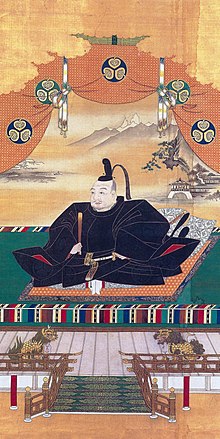Tokugawa Ieyasu
Appearance

Tokugawa Ieyasu (德川家康, January 31, 1543 – June 1, 1616) was the founder and first shōgun of the Tokugawa shogunate of Japan, which ruled Japan from the Battle of Sekigahara in 1600 until the Meiji Restoration in 1868. He was one of the three "Great Unifiers" of Japan, along with his former lord Oda Nobunaga and Toyotomi Hideyoshi.
Quotes
[edit]- Like most statesmen he thought of religion chiefly as an organ of social discipline, and regretted that the variety of human beliefs canceled half this good by the disorder of hostile creeds. To his completely political mind the traditional faith of the Japanese people—a careless mixture of Shintoism and Buddhism—was an invaluable bond cementing the race into spiritual unity, moral order and patriotic devotion; and though at first he approached Christianity with the lenient eye and broad intelligence of Akbar, and refrained from enforcing against it the angry edicts of Hideyoshi, he was disturbed by its intolerance, its bitter denunciation of the native faith as idolatry, and the discord which its passionate dogmatism aroused not only between the converts and the nation, but among the neophytes themselves. Finally his resentment was stirred by the discovery that missionaries sometimes allowed themselves to be used as vanguards for conquerors, and were, here and there, conspiring against the Japanese state. In 1614 he forbade the practice or preaching of the Christian religion in Japan, and ordered all converts either to depart from the country or to renounce their new beliefs. Many priests evaded the decree, and some of them were arrested. None was executed during the lifetime of Iyeyasu; but after his death the fury of the bureaucrats was turned against the Christians, and a violent and brutal persecution ensued which practically stamped Christianity out of Japan. In 1638 the remaining Christians gathered to the number of 37,000 on the peninsula of Shimabara, fortified it, and made a last stand for the freedom of worship. Iyemitsu, grandson of Iyeyasu, sent a large armed force to subdue them. When, after a three months’ siege, their stronghold was taken, all but one hundred and five of the survivors were massacred in the streets.

